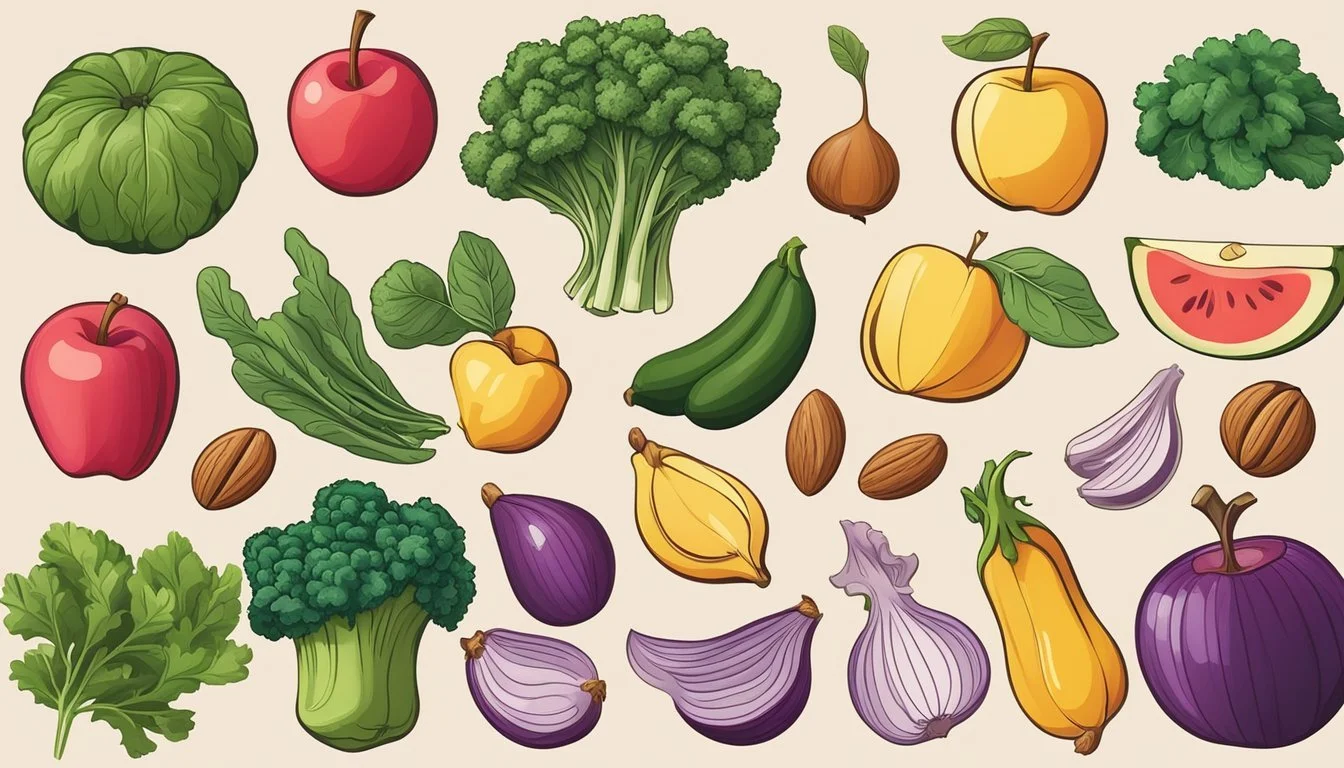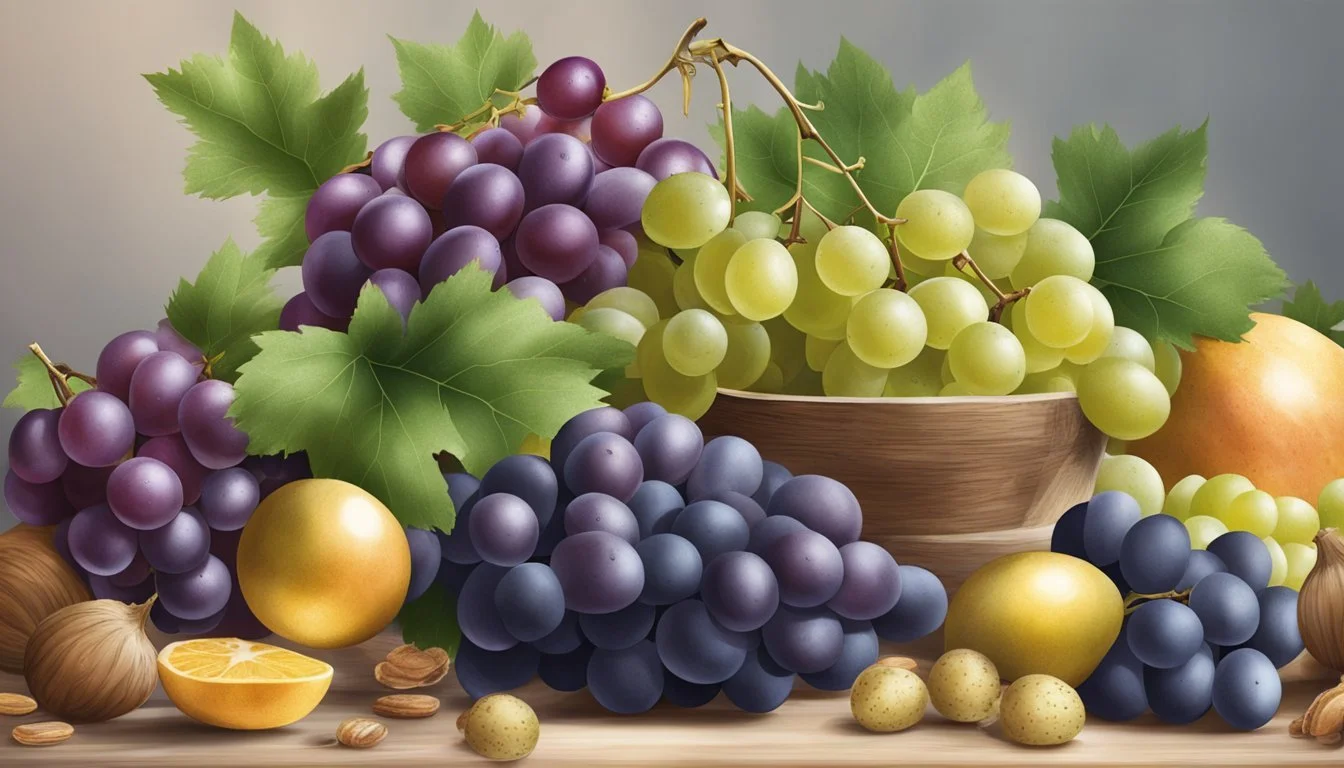Top Foods Rich in Quercetin and Zinc
Essential Nutrients for Optimal Health
Understanding the nutritional benefits of foods high in quercetin and zinc is essential for anyone looking to improve their diet. These compounds are found in fruits, vegetables, and various other food sources, contributing significantly to health and wellness.
Quercetin and zinc play crucial roles in promoting overall well-being, supporting functions like immune defense and cellular health. Including a variety of quercetin- and zinc-rich foods in one's diet can help ensure these benefits are realized effectively.
1) Kale
Kale is a leafy green vegetable known for its impressive nutrient profile. Among its many benefits, kale is rich in quercetin, a type of flavonoid. One cup of raw kale contains approximately 23 mg of quercetin. This compound is known for its antioxidant properties.
In addition to quercetin, kale is also a good source of zinc. Zinc plays a crucial role in immune function and cell growth. A single cup of cooked kale provides about 0.3 mg of zinc, contributing to daily nutritional needs.
Kale is versatile and can be eaten raw or cooked. It can be added to salads, smoothies, or soups. Kale chips are a popular way to enjoy this nutrient-dense food.
Incorporating kale into the diet offers a substantial intake of both quercetin and zinc. These nutrients work together to promote overall health, making kale a valuable addition to any meal plan.
2) Red Onions
Red onions are an excellent source of quercetin, a powerful antioxidant. Quercetin is concentrated in the colorful pigment of the outer layers of the onion. This bioflavonoid supports heart health, strong bones, and helps combat common colds and flu.
To maximize quercetin intake, it's important to retain the outer layers as much as possible. Red onions provide around 45 mg of quercetin, making them one of the richest sources of this antioxidant.
In addition to quercetin, red onions are nutrient-rich, supplying essential vitamins and minerals. They contain vitamin C, which enhances immune function, and dietary fiber, which promotes digestive health. Red onions also offer sulfur compounds that support detoxification processes in the body.
3) Cherry Tomatoes
Cherry tomatoes are a notable source of quercetin. This bioflavonoid is present in the skin, making cherry tomatoes a valuable addition to the diet for its antioxidant properties.
These small tomatoes also contain other beneficial nutrients. They are high in vitamins A and C, which contribute to immune function and skin health.
In terms of zinc, tomatoes offer a modest amount. Zinc is essential for immune function, protein synthesis, and wound healing. Though not as rich in zinc as certain nuts and seeds, cherry tomatoes can still contribute to daily intake.
Additionally, cherry tomatoes make a great low-calorie snack, providing just 37 calories per dozen. Their combination of nutrients and antioxidants makes them a healthy option for daily consumption.
Their versatility allows them to be enjoyed raw in salads, or cooked in various dishes, making it easy to incorporate them into meals.
4) Broccoli
Broccoli is a well-known member of the cruciferous vegetable family. It is rich in a variety of nutrients, including quercetin and zinc. These nutrients are essential for promoting overall health and well-being.
Quercetin, a powerful antioxidant, is present in broccoli. This compound helps to reduce inflammation and may support heart health. Including broccoli in the diet can be a natural way to boost quercetin intake.
Zinc, another vital nutrient found in broccoli, plays a crucial role in immune function. It supports the body's ability to fight off infections and can aid in the healing process. A serving of broccoli provides a good amount of zinc, making it a valuable addition to the diet.
Besides quercetin and zinc, broccoli is also rich in vitamins C and K, and fiber. These additional nutrients contribute to the many health benefits associated with consuming broccoli regularly.
Including broccoli in meals is simple. It can be steamed, roasted, or added to salads and stir-fries. Its versatility in cooking makes it easy to incorporate into various dishes.
Incorporating broccoli into a balanced diet can provide significant nutritional benefits. Its combination of quercetin, zinc, and other beneficial nutrients makes it an excellent choice for those looking to improve their overall health.
5) Brussels Sprouts
Brussels sprouts are an excellent source of quercetin and zinc. Known for their dense nutrient profile, these small, leafy vegetables are a staple in many healthy diets.
A 100-gram serving of cooked Brussels sprouts contains approximately 4.33 milligrams of quercetin. This flavonoid is known for its antioxidant properties and potential health benefits.
In addition to quercetin, Brussels sprouts also provide a moderate amount of zinc. Zinc is crucial for immune function, cellular growth, and DNA synthesis.
Incorporating Brussels sprouts into meals can support overall health due to their rich nutrient content. They can be enjoyed roasted, steamed, or even raw in salads.
6) Cranberries
Cranberries are an excellent source of quercetin, a powerful flavonoid with antioxidant properties. They provide about 14 mg of quercetin per 100 g, making them one of the top fruits for quercetin content.
The high quercetin content in cranberries contributes to their anti-inflammatory and immune-boosting benefits. This makes them a valuable addition to any diet aimed at increasing antioxidant intake.
In addition to quercetin, cranberries contain other beneficial compounds like polyphenols and vitamins. Regular consumption of this fruit can support overall health by reducing oxidative stress and promoting a healthy immune response.
7) Grapes
Grapes, particularly dark-colored varieties, are notable sources of quercetin. Dark grapes contain around 3 milligrams of quercetin per 100 grams, making them a beneficial addition to a diet focused on polyphenols. Both fresh grapes and red wine derived from them offer these healthful compounds.
Red wine, including popular varieties like Shiraz, contains significant amounts of quercetin. About 3 milligrams of quercetin can be found in 100 milliliters of red wine, which is roughly half a cup. Shiraz wine typically has higher quercetin content compared to other types.
Grapes are also beneficial for their resveratrol content. Resveratrol is another polyphenol that contributes to anti-aging processes. Although quercetin is a primary focus, the combination of these compounds makes grapes a valuable fruit for enhancing one's diet.
By integrating grapes into meals or enjoying them as snacks, individuals can efficiently increase their intake of quercetin and other beneficial polyphenols. Incorporating grapes and red wine in moderation can be a tasty approach to boosting overall antioxidant levels.
8) Blueberries
Blueberries are a nutrient-packed fruit rich in various vitamins and antioxidants. One of the key nutrients found in blueberries is quercetin. This powerful antioxidant helps protect the body from free radicals, supporting overall cellular health.
In addition to quercetin, blueberries offer a modest amount of zinc. While the zinc content is not as high as some other foods, it still contributes to the body's overall zinc intake.
Regular consumption of blueberries may support heart health due to their high levels of antioxidants. These small fruits are also known to have anti-inflammatory properties, which can be beneficial for maintaining healthy blood vessels.
Blueberries are versatile and can be added to various dishes. They make a great addition to smoothies, yogurt, salads, and baked goods, providing both flavor and nutritional benefits.
Blueberries are also relatively low in calories, making them a healthy choice for those looking to manage their weight. They are naturally sweet and can satisfy sugar cravings without the added sugars found in processed snacks.
Keeping blueberries in a regular diet can enhance antioxidant intake and provide essential nutrients like quercetin and zinc.
9) Garbanzo Beans
Garbanzo beans, also known as chickpeas, are a nutritious legume commonly included in various diets. They are packed with numerous health benefits.
Garbanzo beans are an excellent source of quercetin. Quercetin is a type of flavonoid that has antioxidant properties, which can help protect the body from free radical damage. Including garbanzo beans in meals can contribute to adequate quercetin intake.
These beans are also rich in zinc. Zinc is essential for immune function, wound healing, and DNA synthesis. Adding garbanzo beans to your diet can help meet the body's zinc requirements.
Additionally, garbanzo beans are high in fiber, promoting heart health by potentially reducing the risk of heart disease. They contain both soluble and insoluble fibers, which support digestive health.
Incorporating garbanzo beans into meals is versatile. They can be used in salads, soups, stews, and pureed into hummus. This makes them an easy addition to any diet, providing both flavor and nutritional benefits.
10) Pecans
Pecans are a notable source of quercetin, a flavonoid with antioxidant properties. Although their quercetin content isn't the highest among foods, pecans still contribute to an individual's overall intake when included in their diet.
These nuts are rich in essential minerals. Pecans provide manganese, magnesium, zinc, and copper, making them a nutritious addition to meals and snacks.
Incorporating pecans into your diet can be as simple as adding them to salads, oatmeal, or enjoying them as a standalone snack. Their versatility in recipes adds both nutritional value and a pleasant crunch. Regular consumption of pecans can help enhance both mineral and quercetin intake.
Health Benefits of Quercetin and Zinc
Quercetin and zinc offer a range of health benefits, particularly in their roles as antioxidants and in supporting the immune system.
Antioxidant Properties
Quercetin and zinc are both known for their powerful antioxidant properties. Quercetin effectively scavenges free radicals, reducing oxidative stress and minimizing cellular damage. This can help protect the body from various chronic diseases.
Zinc also plays a significant role in neutralizing harmful free radicals. It is crucial for the function of superoxide dismutase (SOD), an enzyme that protects cells from oxidative damage. Together, quercetin and zinc bolster the body's defense against oxidative stress more effectively than either could alone.
Immune System Support
Both quercetin and zinc are essential for maintaining a healthy immune system. Quercetin acts as a zinc ionophore, enhancing zinc's ability to enter cells and fight pathogens. This synergy improves their combined antiviral and antibacterial properties.
Zinc is necessary for the normal development and function of cells that mediate both innate and adaptive immune responses. Low zinc levels can impair immune function, making the body more susceptible to infections. By working together, quercetin and zinc can provide more comprehensive immune support.
Absorption and Bioavailability
Understanding how quercetin and zinc are absorbed and their bioavailability is essential for maximizing their benefits. Several factors influence their absorption, and strategies exist to enhance their bioavailability.
Factors Affecting Absorption
Quercetin’s absorption is significantly influenced by its solubility and stability. Its water-insoluble nature hinders its uptake in the gastrointestinal tract. Additionally, quercetin’s chemical structure and the presence of other dietary components play crucial roles. Zinc absorption, on the other hand, can be affected by dietary factors such as phytates found in grains and legumes, which bind zinc and reduce its availability.
Digestion processes and the overall health of the gastrointestinal tract also impact absorption. Enzymatic activity and the presence of certain beneficial gut flora are vital for breaking down quercetin into absorbable forms. For zinc, the presence of stomach acid is important to solubilize zinc and facilitate its absorption in the small intestine.
Enhancing Bioavailability
To enhance the bioavailability of quercetin, various formulation strategies have been developed. One notable approach is using quercetin phytosomes, which combine quercetin with lecithin to improve its water solubility and stability, thus enhancing absorption. Consuming quercetin with fats can also aid in better absorption due to its fat-soluble nature.
For zinc, avoiding anti-nutrient rich foods and instead pairing zinc with amino acids or organic acids like vitamin C can improve its bioavailability. Supplements or diets combining zinc with these components can significantly enhance absorption. Additionally, ensuring adequate overall nutrition, such as protein intake, supports the body's ability to effectively absorb and utilize zinc.









